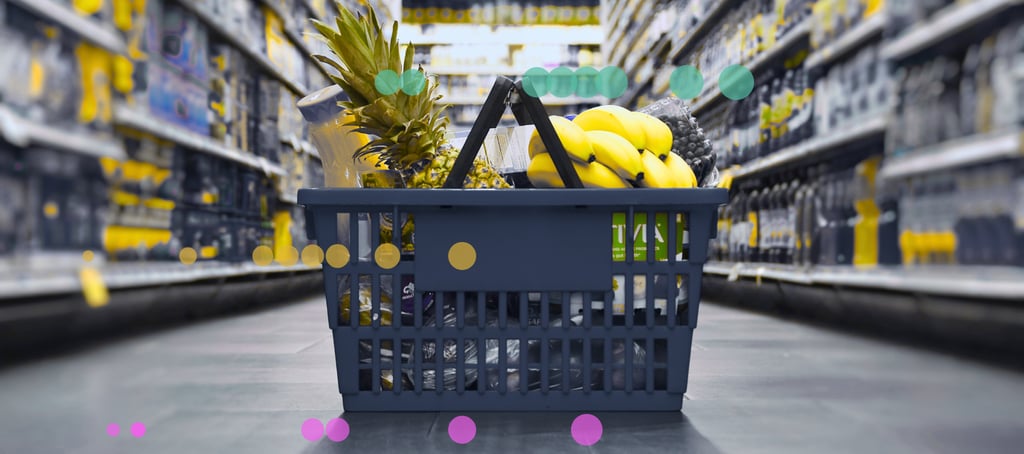94 Essential Statistics Shaping the Future of AI in Retail
Get all the data-driven statistics on AI in retail you could need to make the best AI strategy decisions for your retail business. Understand consumer trends, operational shifts, and strategic adoption to inform your business decisions.
AI IN RETAIL AND ECOMMERCE
Garret Farmer-Brent
8/14/20256 min read


Artificial intelligence is no longer a futuristic concept in the retail industry; it's a present-day reality that is actively reshaping every facet of how consumers shop and how businesses operate. From personalizing the customer journey to optimizing complex supply chains, the impact of AI in retail is profound and accelerating. For business owners and marketers, understanding the key data points behind this transformation is crucial for making informed strategic decisions.
This guide provides 94 of the most important statistics, sourced from leading industry reports, to give you a clear, data-driven snapshot of the state of AI in retail today.
Main sections in this article:
The AI-Powered Customer Experience: How conversational AI is enhancing the customer shopping journey.
AI's Impact on Operational Efficiency: How AI automation is streamlining backend retail operations.
The AI Trust & Personalization Paradox: Consumer trust in AI personalization and data privacy concerns.
Sector-Specific AI Disruption: How generative AI is uniquely impacting different retail sectors.
AI's Role in Ecommerce and Online Marketplaces: How AI in ecommerce is shaping online marketplaces.
The Future of the AI-Driven Retail Ecosystem: The AI-driven ecosystem is changing product discovery and search.
Retailer Adoption and Strategy: Retailer strategies for adopting AI tools for business growth.
The Rise of AI Agents and Autonomous Shopping: The emergence of AI agents for shopping and commerce.
AI's Impact on Marketing and Advertising: How AI in marketing is reshaping retail media advertising.
Discover how conversational AI and virtual assistants are transforming the customer journey and enhancing the shopping experience.
62% of shoppers are likely to buy if a guided AI experience finds what they want. (Coveo, 2025)
61% would use a virtual assistant if it could answer questions in real-time. (Coveo, 2025)
51% of consumers want AI to help them find products faster. (Twilio, 2025)
49% want AI to resolve service issues more efficiently. (Twilio, 2025)
GenAI is trusted for recommendations (18%) more than friends and family (13%). (Accenture, 2025)
35% of shoppers have used AI-powered guidance or chatbots to help with a purchase. (Coveo, 2025)
22% of shoppers use AI for product discovery and inspiration at least occasionally. (Salesforce, 2025)
30% of adults want GenAI to generate product guides for their buying situation. (Coveo, 2025)
The AI-Powered Customer Experience
AI's Impact on Operational Efficiency
Learn how AI automation is streamlining backend retail operations, from inventory management to sales forecasting and logistics.
72% of digital retailers believe AI will be the most impactful trend on their business. (Bolt, 2024)
41% of restaurant operators plan to roll out AI for sales forecasting and scheduling. (Restaurant365, 2023)
31% of restaurant operators plan to use AI for inventory and purchasing. (Restaurant365, 2023)
Automated shopping bots accounted for 57% of all ecommerce web traffic during the holidays. (Radware, 2025)
Malicious bots comprised 31% of ecommerce web traffic during the same period. (Radware, 2025)
One in three people who click on an automated message make a purchase. (Omnisend, 2025)
The AI Trust & Personalization Paradox
Explore the critical balance between consumer trust in AI personalization and growing concerns over data privacy and ethical AI.
76% of consumers are hesitant or not comfortable sharing data with AI shopping tools. (EMARKETER/CivicScience, 2025)
70% of consumers feel "emotionally manipulated" by AI shopping assistants. (Chadix, 2025)
64% of consumers believe AI is biased toward specific products. (CouponFollow, 2025)
Only 24% of consumers are comfortable sharing their data with an AI shopping tool. (EMARKETER/CivicScience, 2025)
43% trust AI recommendations only when they are personalized and explainable. (Coveo, 2025)
37% cite security concerns as a barrier to adopting AI shopping tools. (Walmart, 2025)
33% are concerned about getting irrelevant product suggestions from AI. (Walmart, 2025)
33% of consumers think AI will have a negative impact on their lives. (EMARKETER/CivicScience, 2025)
Sector-Specific AI Retail Disruption
See how generative AI is uniquely impacting different retail sectors, including fashion, beauty, grocery, and QSR.
Fashion: 40% of adults are interested in styling advice based on their body shape. (Mintel, 2025)
Fashion: 20% of adults are interested in AI-generated clothing recommendations. (Mintel, 2025)
Fashion: 27% of shoppers are interested in quizzes to help find their personal style. (Mintel, 2025)
Beauty: 34% of internet users have bought a beauty product after seeing it on social media. (Mintel, 2024)
Beauty: 30% of online beauty shoppers have bought fragrances online. (Mintel, 2024)
Grocery: 64% of grocery shoppers are willing to try smart carts in-store. (EMARKETER, 2024)
Grocery: Only 9% of grocery shoppers have actually used smart carts. (EMARKETER, 2024)
Grocery: 19% of consumers believe AI will make grocery shopping more convenient. (Algolia, 2024)
Grocery: 56% of consumers are not interested in interacting with AI for food experiences. (Algolia, 2024)
QSR: Only 4% of adults prefer to use an AI chatbot for drive-thru orders. (YouGov, 2025)
QSR: 55% of adults still prefer a human to take their drive-thru order. (YouGov, 2025)
QSR: 25% of restaurant operators plan to roll out AI in the kitchen. (Restaurant365, 2023)
Travel: 83% of adults want to redeem loyalty points for travel. (Expedia Group, 2025)
Travel: 43% of travelers use AI chatbots to generate travel inspiration. (Adobe, 2025)
Is your retail business ready for the next upgrade to you technology mix – but you don't know where to start?
AI's Role in Ecommerce and Online Marketplaces
See how AI in ecommerce is shaping online marketplaces, mobile shopping, and digital checkouts.
90% of Gen Z and Millennials have shopped on an online marketplace. (Mintel, 2024)
72% of digital retailers are focusing on omnichannel commerce strategies. (Bolt, 2024)
63% of digital retailers are focusing on enhanced mobile shopping experiences. (Bolt, 2024)
62% of higher-earners are interested in AI assistants on online marketplaces. (Mintel, 2024)
53% of retailers are focusing on checkout and payment innovations. (Bolt, 2024)
51% of consumers want frictionless payments in online stores. (Klarna, 2023)
48% of consumers want personalized product recommendations online. (Klarna, 2023)
Online sales accounted for 26.5% of all retail sales in April 2025. (Mintel, 2025)
23% of shoppers want assistance via live chat on an app/website. (Mintel, 2024)
The Future of the AI-Driven Retail Ecosystem
Understand how the AI-driven ecosystem is changing product discovery, consumer search behavior, and the overall retail landscape.
Retail traffic from GenAI sources grew 1,200% between July 2024 and February 2025. (Adobe, 2025)
55% of consumers use GenAI for shopping research. (Adobe, 2025)
43% use GenAI to seek deals on products. (Adobe, 2025)
Only 4% of adults start their product search with a chatbot or AI tool. (Auctane/Retail Economics, 2024)
56% of adults still start their product search on a traditional search engine. (Auctane/Retail Economics, 2024)
Gen Z shoppers are 10 times more likely than baby boomers to use AI for discovery. (Salesforce, 2025)
Retailer Adoption and AI Strategy
Get insights into retailer strategies for adopting AI tools and autonomous systems to drive business growth and efficiency.
Nearly 90% of business leaders believe personalization will be valuable to their success. (Twilio, 2024)
81% of retailers trust AI to act autonomously with sufficient guardrails in place. (Salesforce, 2025)
72% of retailers say AI agents will be essential for a competitive edge by 2026. (Salesforce, 2025)
67% of retailers believe autonomous AI will bring their business mostly opportunities. (Salesforce, 2025)
64% of restaurants are researching, testing, or running AI initiatives. (Raydiant, 2024)
54% of restaurants plan to ramp up their use of AI in the next year. (Raydiant, 2024)
53% of retailers are currently evaluating the uses of autonomous AI. (Salesforce, 2025)
51% of organizations are currently exploring the use of AI agents. (KPMG, 2025)
43% of retailers are already piloting autonomous AI in their operations. (Salesforce, 2025)
Only 56% of loyalty program owners are satisfied with their current programs. (Antavo, 2024)
38% of restaurant leaders cite better staff scheduling as AI's biggest benefit. (Raydiant, 2024)
A third of retailers are upgrading their data security in preparation for more AI. (Salesforce, 2025)
23% of restaurants find training staff to be the biggest challenge in AI rollouts. (Raydiant, 2024)
Top retail use cases for AI agents include customer service and marketing. (Salesforce, 2025)
Retailers also use AI agents for inventory management and associate training. (Salesforce, 2025)
The Rise of AI Agents and Autonomous Shopping
This section covers the emergence of AI agents for shopping, which are poised to revolutionize autonomous commerce.
70% of shoppers are interested in AI agents optimizing their loyalty program points. (Salesforce, 2025)
66% want agents to secure high-demand products before they sell out. (Salesforce, 2025)
66% are interested in AI agents buying items when they reach a target price. (Salesforce, 2025)
52% are interested in agents buying complementary items based on existing products. (Salesforce, 2025)
47% are interested in agents purchasing recommended products on their behalf. (Salesforce, 2025)
60% of consumers make frequent impulse purchases based on AI suggestions. (Chadix, 2025)
AI's Impact on Marketing and Advertising
Find out how AI in marketing is reshaping retail media networks, advertising spend, and consumer engagement strategies.
74% of consumers think AI is better than humans at finding deals. (CouponFollow, 2025)
Worldwide retail media ad spend increased by 17.9% in 2024. (EMARKETER, 2025)
Retail media ad spend increased by 23% YoY in Q4 2024. (Skai, 2025)
Retail media ad impressions increased by 28% YoY in Q4 2024. (Skai, 2025)
72% of Gen X have used an AI shopping assistant, primarily on Amazon. (CouponFollow, 2025)
54% of Gen Z are comfortable with AI making purchases for them. (CouponFollow, 2025)
Consumers trust Amazon's AI (56%) more than twice as much as Target's (25%). (CouponFollow, 2025)
Google's AI shopping assistant trust (34%) trails Amazon but leads Apple (20%). (CouponFollow, 2025)
73% of consumers feel "bombarded" by advertising. (Accenture, 2024)
74% of consumers have abandoned purchases because they felt overwhelmed by choice. (Accenture, 2024)
41% say it now takes more time and effort to make a purchase decision. (Accenture, 2024)
27% of consumers trust AI shopping recommendations. (Walmart, 2025)
24% of consumers trust recommendations from social media influencers. (Walmart, 2025)
54% would like an AI shopper that knows their preferences well. (Walmart, 2025)
48% of consumers said AI improves their retail experience. (Walmart, 2025)
22% of adults are comfortable using digital voice assistants for purchasing. (Cognizant/Oxford Economics, 2025)
21% are comfortable using conversational AI for purchasing. (Cognizant/Oxford Economics, 2025)
16% are comfortable using chatbots for purchasing. (Cognizant/Oxford Economics, 2025)
14% are comfortable with dynamic pricing powered by AI. (Cognizant/Oxford Economics, 2025)
Begin your AI business upgrade today by taking our comprehensive AI Readiness Assessment.
You'll receive a full business analysis report at no charge.




